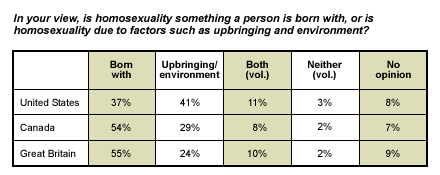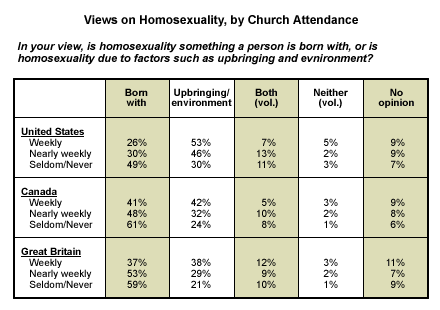Nature or nurture? The question of whether homosexuality is something a person is born with, or is due to factors such as upbringing and environment, is frequently debated worldwide, especially in countries (such as the United States) where same-sex marriage is a key political issue. Gallup recently polled Americans, Canadians, and Britons about their views*, and found that slight majorities of people in Canada and Great Britain use "nature" to explain the origin of homosexuality. Americans, on the other hand, are about evenly divided between the "nature" and "nurture" arguments.
Fifty-five percent of Britons and 54% of Canadians believe that homosexuality is "something a person is born with." About a quarter in each country (24% of Britons and 29% of Canadians) take the opposite view, saying that factors such as upbringing and environment are behind homosexuality. In the United States however, only 37% of respondents feel that homosexuality is something a person is born with, while a similar percentage, 41%, think that upbringing and environment lead to a person to be attracted to others of the same sex. In all three countries, about one in five respondents either volunteer answers of "neither" or "both" to this question, or have no opinion.

Why the Difference?
The data show that religious commitment, defined by frequency of church attendance, is related to opinion on this topic, and not just in the United States. In all three countries, people who attend church more often are less likely to believe that homosexuality is something that people are born with and more likely to believe that it stems from upbringing or environment. In the United States, a quarter (26%) of those who report that they attend church weekly believe that homosexuality is something a person is born with, whereas almost half (49%) who seldom or never attend church feel this way. Similar patterns emerge in Great Britain and Canada.

Because survey data consistently show that Americans tend to be more religious than either Canadians or Britons (see "Worlds Apart: Religion in Canada, Britain, U.S." in Related Items), it is not surprising that Americans are more likely than those in the other two countries to favor the "nurture" argument.
Robert K. Knight is director of the Culture and Family Institute at Concerned Women for America, a conservative American public policy organization. Knight feels the media in all three countries have a left-wing bias, but says "there is a livelier, alternative press in this country [the United States], including talk radio, that directly challenges the liberal media who are biased in favor of the 'born gay' theory." (Knight himself espouses the view that homosexuality results from a person's upbringing.) "Europe and Britain both labor under a virtual monopoly of left-wing news sources and people are only getting one side of the story."
Mitchel Raphael, editor in chief of fab, a gay culture and lifestyle magazine based in Ontario, believes that sexuality cannot be fully explained by either nature or nurture. Although his views on the topic of homosexuality are quite different from Knight's, Raphael agrees that the media and politics highly influence people's opinions. "Most people have been brainwashed about sexuality for political reasons -- by both the religious right and gay activists," says Raphael. "Sexuality exists along a spectrum. Some people may be stuck at one point, many shift over time."
"The discrepancies in the countries … simply represent who has been able to manipulate the minds of the masses best," Raphael adds. "Environment/nature debates simplify a complicated process -- but are effective as a tool of political manipulation for people who seek simple solutions."
Bottom Line
The tendency of Americans to answer this question differently from Canadians or Britons is certainly tied to religion. But could there be other cultural reasons why Americans are less likely than others to believe that sexuality is determined at birth? Ron Inglehart is the director of the World Values Survey at the University of Michigan, a project that studies sociocultural and political change throughout the world. Inglehart believes that characteristics specific to American culture may also be influencing public opinion about homosexuality.
The U.S. results for the "nature vs. nurture" question are "very much in keeping with the American tendency to emphasize individual responsibility rather than societal responsibility for virtually any type of social issue," Inglehart says. "This tendency is linked with the relatively limited scope of the welfare state in the U.S. by comparison with other equally developed countries. It is an aspect of American exceptionalism in which the U.S. is more likely to emphasize traditional values on such topics as religion and national pride."
*Results in the United States are based on telephone interviews 1,000 national adults, aged 18 and older, conducted May 2-4, 2004. For results based on the total sample of national adults, one can say with 95% confidence that the maximum margin of sampling error is ±3 percentage points. The survey was conducted by Gallup USA.
Results in Canada are based on telephone interviews with 1,005 national adults, aged 18 and older, conducted Aug. 30-Sept. 6, 2004. For results based on the total sample of national adults, one can say with 95% confidence that the maximum margin of sampling error is ±3 percentage points. The survey was conducted by Gallup Canada.
Results in Great Britain are based on telephone interviews with 1,009 national adults, aged 18 and older, conducted Aug. 25-Sept. 7, 2004. For results based on the total sample of national adults, one can say with 95% confidence that the maximum margin of sampling error is ±5 percentage points. The survey was conducted by Gallup UK.
